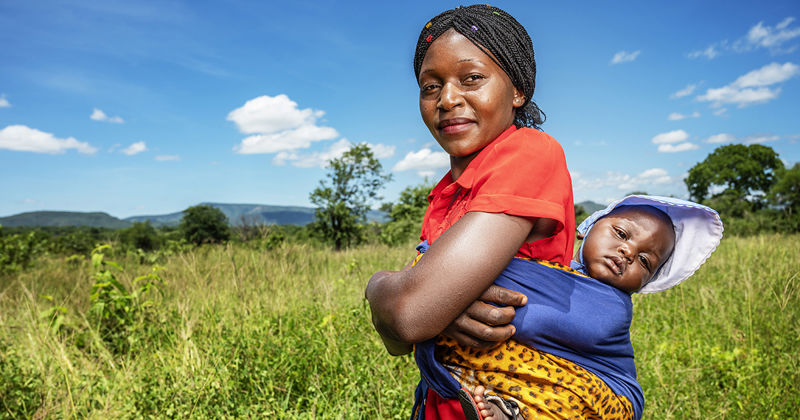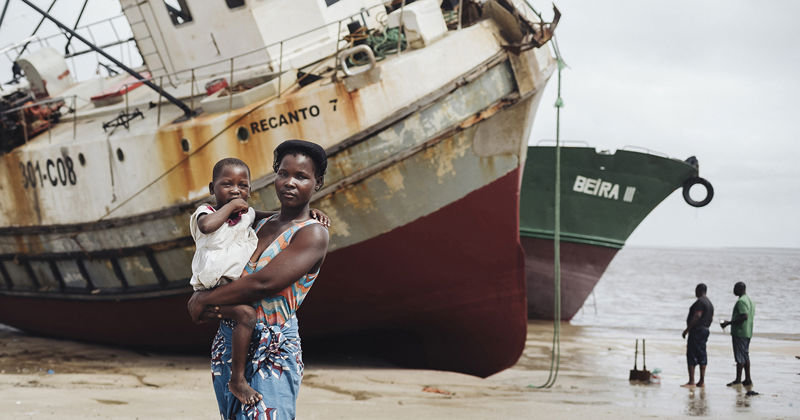Community radio and bus drivers as tools against covid-19

The International Red Cross is carrying out an extensive coronavirus vaccination operation in six African countries, supported by the EU.
Standing tall, Pauline Ebei is the first person in the morning at the vaccination point of the village of Kianja located in Isiolo, north-eastern Kenya. The vaccination point is located under a tree near the yard of the village school.
Ebei takes her ID out of a plastic bag and hands it to the vaccination point worker. She is in a serious mood as she is about to receive her first COVID-19 vaccination.
“I heard from a neighbour that vaccinations are given here today, and while I was on my way to the market, I decided to come. I don’t know much about the disease, but I know that it spreads easily and is a new illness. That is why I decided to come,” she recounts.

Pauline Ebei is 71 years old and lives together with her husband, her daughter and her daughter’s four children. The family make their living with cows and sheep. Pauline is planning to urge her husband and daughter to get vaccinated when she returns home.
Veronica Nasuru is also among the first people to get vaccinated. She has had COVID-19, due to which she was also hospitalised. She knows how severe the disease is and definitely wants to get vaccinated. She heard about the vaccination opportunity on the radio.
She has four children and a husband. She does not believe that her husband will get vaccinated, as he is afraid of dying from it.
Veronica Nasuru’s husband is an example of why coronavirus vaccination operations are making such slow progress in Kenya. Only 27 % of the country’s population have been fully vaccinated. Prejudices and misconceptions abound. The most common belief is that the new vaccine is a conspiracy to regulate birth rates.
Vaccines for hundreds of thousands
Supported by the EU, the Red Cross has begun an extensive coronavirus vaccination project, the objective of which is to vaccinate people in six African countries: Kenya, Somalia, Guinea, Madagascar, Malawi and Mozambique. In Kenya, the aim is to vaccinate around 300,000 people.
Information provision and education also play an important part of the project. The message that getting vaccinated is important must also be conveyed to the remote areas of Kenya, as well as refugees who are in a vulnerable position.
The objective is to have 15 % of the population of the nine most remote counties vaccinated. Mathias Eick, the spokesperson for the EU’s humanitarian operations in Nairobi, believes that this objective will also be reached with the methods selected.

“The EU is spending a hundred million euros on this vaccination campaign in Africa, including Kenya,” he says.
Imams dismantling prejudices
Isiolo County currently has the lowest vaccination rate in the entire country.
“The local communities are very conservative. We’re trying to influence the village elders, religious leaders, and other influential people. Personally, I’ve been on the radio to talk about the importance of the vaccination and respond to rumours and prejudices,” says Red Cross regional worker Mary Kariuki.
The secretary for the council of local imams, sheikh Diba Nura Abdula, is a key influencer in Isiolo. His own mosque alone is visited by hundreds of praying people every day. Almost half of the population in the area are Muslims. The sheikh estimates the number to be around 150,000 people.
“I’m one of the influencers, and I’ve been trained to tell my own community about the importance of getting vaccinated. I work hard in my community to promote it. Very many people are now convinced that the vaccination doesn’t have any side effects or purposes other than combating COVID-19,” the sheikh says.
Religious leaders are turning to their parishes, telling them that as responsible leaders, they would never urge any parish members to do anything dangerous, and neither does the Kenyan government. However, the sheikh’s parish has been influenced the most by the example of he himself getting vaccinated.

“I got vaccinated as a role model and because I know that the disease is dangerous. I have to travel all over the country due to my work, and on the other hand, I meet a lot of people at prayer gatherings. I don’t want to fall ill or make anyone else ill. I’ve seen numerous people contract the virus and die,” the sheikh concludes.
He also told people about his own vaccination immediately in the parish’s WhatsApp group, where his post received plenty of visibility and comments.
Vehicle drivers are getting vaccinated
The drivers of local public transport vehicles, i.e. minibuses called ‘matatu,’ buses and motorcycle taxis called ‘boda boda,’ are also involved in the education campaign. They are organised in their own associations, providing a convenient channel for spreading education.
Vaccination campaigns have been held for drivers, and three quarters of all drivers are estimated to be vaccinated already.
“We’re constantly on the move, travelling between cities. That makes it important for us to be vaccinated,” says Stephen Gitare Wanjinu.
He is a ‘matatu’ driver, driving primarily from Isiolo to Nairobi, but also to Nakuru and Marsabit.

“I know that the vaccination doesn’t mean that I’m 100% safe. As many passengers as possible must also be vaccinated,” he continues.
Message conveyed over radio waves
A white Red Cross tent has been erected in the yard of the hospital of Kabarnet, the capital of Isiolo’s neighbouring county of Baringo, and people are already waiting for the first vaccinations of the morning. The vaccines for the entire area are stored in the facilities of the hospital.
Head nurse Rosemary Chesang is showing freezers filled with vaccines. There are vaccines from four different manufacturers. Coolers filled with ice cubes keep the vaccines viable even when transported to faraway vaccination points.
Everyone agrees that success in the vaccination campaign relies on communication. As such, local radio stations have also been recruited to spread the word about the importance of getting vaccinated.
In Kabarnet, the campaign is supported by the Alpha radio station. The station is private, but its programming is aimed deliberately at the communities of the area, with whom the station also collaborates often.

“The key messages have to do with talking about the importance of vaccinations and increasing awareness regarding the coronavirus and ways to combat it. Wednesdays are reserved for a health theme. In that programme slot, we talk about the coronavirus in three languages: English, Swahili and the Maa language of the Ilchamus people,” says the head of the radio station Samuel Nyachiro.
The station’s transmitter is placed on a hill, ensuring a range of up to 120 kilometres with up to 300,000 listeners tuning in.
Text: Hilkka Hyrkkö


Development cooperation
